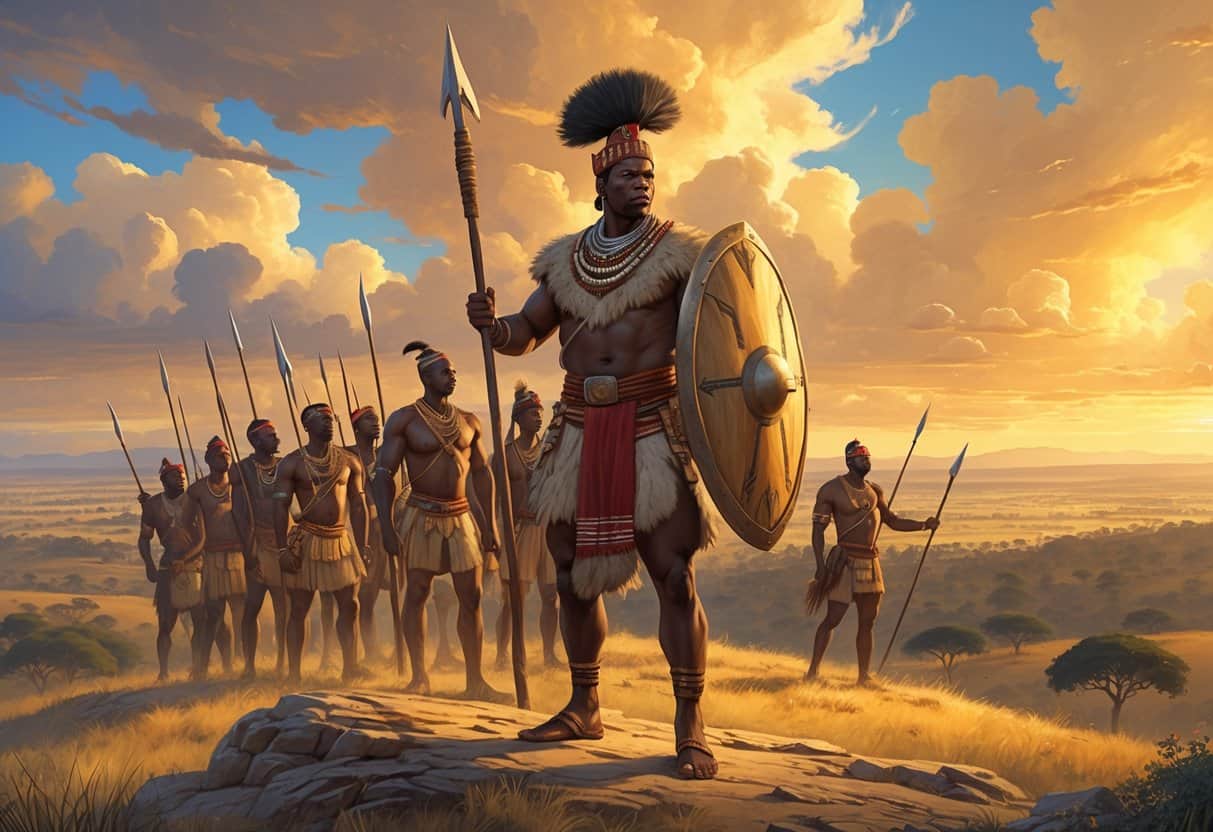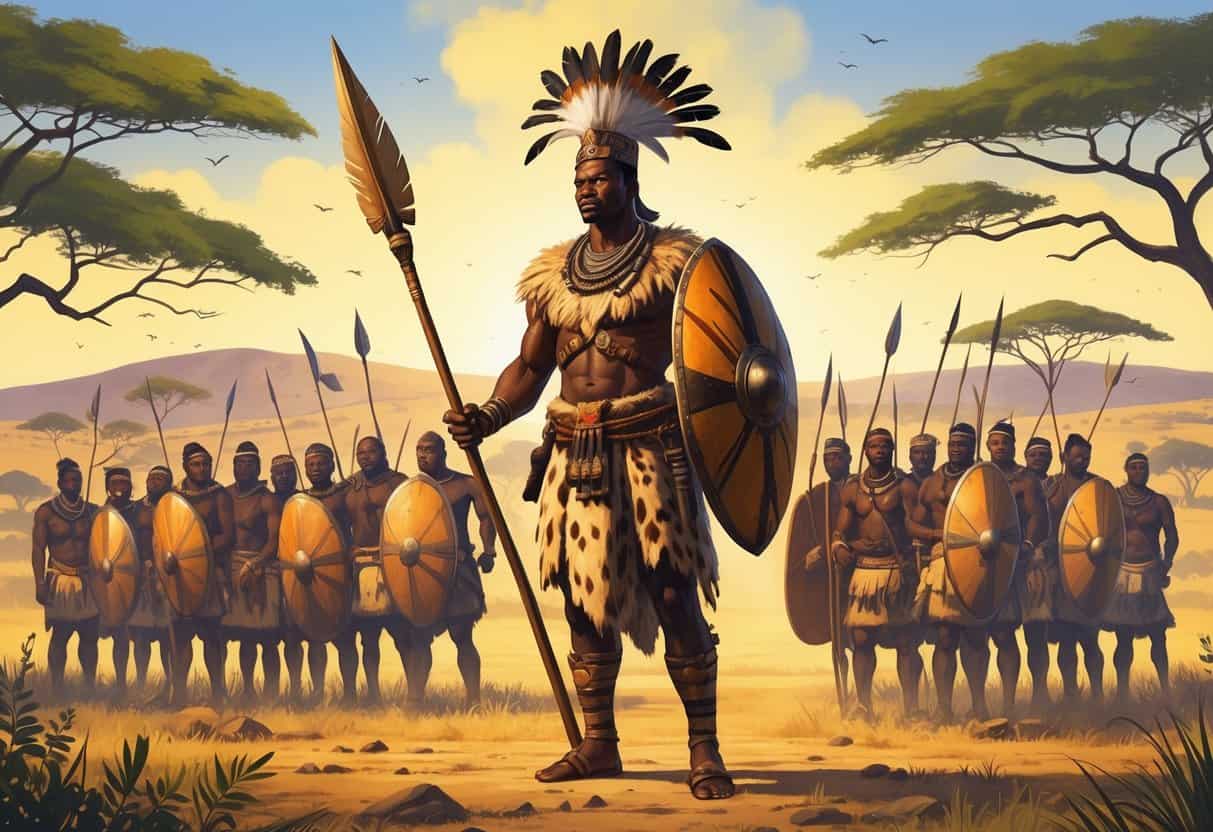The rise of the Zulu Empire under Shaka shook up southern Africa’s history in a big way. Shaka, both a fierce leader and a clever warrior, managed to bring together scattered tribes into a single, powerful kingdom.
Let’s dig into how Shaka’s leadership and military brains turned the Zulu into a force nobody could ignore.

Shaka’s rule changed everything for the Zulu army. He brought in new tactics and organization, building a bigger kingdom and shaking up the region’s social and political setup.
If you want to understand why the Zulu Empire became so influential in the 19th century, you’ve got to look at how it all started.
This guide will walk you through the moments and ideas that made Shaka’s rise possible. It’s not just history—it’s why the Zulu still matter today.
Key Takeways
- Shaka united many tribes to create the Zulu Empire.
- His military tactics expanded Zulu power across the region.
- The empire’s growth changed southern Africa’s social and political landscape.
Historical Context and Origins

To get the Zulu story, you’ve got to know where they came from, how local politics worked, and what pushed people to move around. These things shaped the rise of the Zulu nation.
Nguni Roots and Early Zulu Society
It starts with the Nguni people—the Zulu’s ancestors. The Nguni were a bunch of related tribes living mostly in what’s now KwaZulu-Natal.
They shared language and customs, but each group lived in its own little community.
The early Zulu were just one small Nguni chiefdom. Their world revolved around family, cattle, and clan ties.
Cattle meant wealth and status. Chiefs led the clans and made the big decisions.
Chiefdoms and Political Systems of Southern Africa
Before Shaka, the land was a patchwork of chiefdoms. Every chiefdom had its own leader, ruling over a handful of families or clans.
Leaders sometimes made alliances or fought neighbors to get ahead, but most stayed independent.
Politics were simple but got the job done. Chiefs leaned on elders and warriors for support.
Leadership usually passed down through families, but a chief had to show he could protect his people. It was a competitive world.
Population Pressure and Migrations
By the early 1800s, more people meant less land and food to go around. This pressure forced groups to move, sparking migrations all over southern Africa.
Some tribes got pushed out. Others were swallowed up by stronger neighbors.
All these movements led to fighting and redrawn boundaries. The Zulu, with Shaka at the helm, took advantage of the chaos.
They conquered nearby groups, uniting many under one kingdom in KwaZulu-Natal. That’s how the foundation for the Zulu Empire was set.
Rise and Leadership of Shaka
Let’s look at how Shaka grabbed power, changed the Zulu system, picked his allies, and reshaped the culture. These are the building blocks of Zulu power.
Shaka’s Ascent to Power
Shaka rose to lead the Zulu after his father died. It wasn’t a smooth path—he faced rejection and plenty of trouble early on.
Driven by sheer will, Shaka wanted to unite the small clans into something bigger.
He won people over by proving himself in battle. After the old chief died, Shaka outmaneuvered rivals with smart tactics.
His strength and reputation drew followers, and before long, he was king. That’s when the Zulu Kingdom really started to grow.
Reforms and State Formation
Shaka shook up the way the Zulu fought. He brought in the short stabbing spear—the iklwa—and reorganized warriors into tight regiments called amabutho.
These changes made the army far more effective. Shaka also centralized power, putting himself at the top.
He tied military service to land, so soldiers owed loyalty to him and the state.
This new political setup helped the Zulu grab territory fast.
Relationship with Dingiswayo and Regional Leaders
Dingiswayo, chief of the Mthethwa, played a big part in Shaka’s early days. He gave Shaka a chance to learn and build political support.
Shaka borrowed a lot from Dingiswayo’s style of leadership and organization.
After Dingiswayo died, Shaka took over his allies and expanded even more.
He managed relationships with neighboring chiefs carefully. Sometimes he used diplomacy, sometimes force, to bring others under his rule.
Cultural Transformation and Initiation Rituals
Shaka didn’t just change the army—he changed culture too. Initiation ceremonies for young men became a big deal.
These rituals marked the step into warrior life and loyalty to the kingdom.
He leaned on belief in ancestral spirits to back up his authority and inspire courage.
The isizulu language spread shared values and rules, making the kingdom feel more united.
Shaka’s cultural tweaks built a strong Zulu identity. Ceremonies reinforced discipline, bravery, and respect for the king.
Military Expansion and the Mfecane
Shaka’s military changes turned the Zulu into a powerhouse and sparked a wave of conflicts.
These battles set off population shifts and tough times, like famine. Other African groups responded in their own ways, and Europeans were lurking in the background.
Innovations in Warfare and Military Structure
Shaka tossed out old fighting methods and brought in the short stabbing spear—the assegai.
Unlike the old throwing spears, this one was for up-close combat.
He sorted men into age-based regiments. They lived and trained together, building discipline and unity.
His tight formation tactics—like the “buffalo horns”—helped surround and crush enemies.
Zulu warriors trained hard, focused on speed and surprise. That’s what made them so effective.
Conflicts with Neighboring Peoples
Shaka’s growing army clashed with neighbors like the Swazi, Basuto, and Tswana.
The Zulu attacked or absorbed smaller groups, swelling their own ranks.
Leaders like Moshoeshoe of the Basuto and Mzilikazi of the Ndebele led their people away to escape.
Power shifted fast. The Zulu expanded using both intimidation and battle, redrawing southern Africa’s map.
Impact of the Mfecane: Depopulation and Migrations
The Mfecane—meaning “crushing” or “scattering”—pretty much sums up the chaos of this era.
Warfare and famine left some regions empty. People fled violence, triggering massive migrations.
Groups like the Ndebele and Tswana traveled huge distances to get away.
These migrations reshaped where people lived, all because of Shaka’s campaigns and the resulting food shortages.
Resistance and the Role of Europeans
Not everyone rolled over for the Zulu. Leaders like Moshoeshoe built alliances to push back.
Europeans weren’t in the thick of it at first, but they watched and sometimes offered weapons or advice.
Their involvement grew later, but during the Mfecane, most of the fighting was between African groups.
Europeans added another twist, but the real drivers of the Mfecane were local.
| Topic | Key Points |
|---|---|
| Warfare Innovation | Assegai, regiments, tight formations |
| Neighbor Conflicts | Swazi, Basuto, Tswana displaced by Zulu attacks |
| Mfecane Effects | Depopulation, famine, migrations of groups |
| Resistance & Europeans | African alliances, limited early European influence |
Legacy and Transformation of the Zulu Empire
The Zulu Empire left a huge mark on southern Africa. It changed how people lived, fought, and organized themselves.
Colonial powers brought new conflicts and forced the Zulu to adapt. The echoes of Shaka’s time are still felt in language, tradition, and identity.
Political and Social Impact in Southern Africa
Shaka’s Zulu Empire flipped the power balance in the region. Smaller chiefdoms either joined up or got beaten.
The Zulu’s military system pushed neighbors to rethink their own defenses.
Shaka’s way of organizing warriors and civilians built a centralized state loyal to the king.
This shift gave the king more power and weakened old clan leaders.
With better land control, agriculture improved too. The political landscape of southern Africa was never the same after Zululand’s rise.
Transition to Colonial Rule and the Anglo-Zulu War
When the British showed up, things changed fast. Theophilus Shepstone annexed Zululand into Natal in 1879, pretty much ignoring what the Zulu leaders wanted.
The Anglo-Zulu War kicked off soon after, fueled by fights over land and power.
The Zulu scored a huge win at Isandlwana, but British numbers and firepower eventually won out.
In the end, the Zulu Empire lost its independence. The British broke Zululand into smaller chiefdoms, ending the old power structures.
Colonial rule took over, and the Zulu kingdom’s political dominance faded—though its legacy definitely didn’t.
Modern Legacy: Culture, Language, and Shaka’s Day
These days, the Zulu language is spoken by millions. It’s actually one of South Africa’s official languages.
You’ll catch its influence in daily life, especially around KwaZulu-Natal. That’s where a lot of Zulu descendants still live.
After colonization, Christianity blended with traditional beliefs. But Zulu culture didn’t just vanish.
Festivals, traditional dress, and dances are still part of life. They keep those old customs going strong.
One big event is Shaka’s Day, every year on September 24. It’s a day set aside to honor Shaka and his impact on the nation.
There are speeches, reenactments, and traditional ceremonies. Honestly, the respect for Shaka and the Zulu Empire still runs deep for so many people.